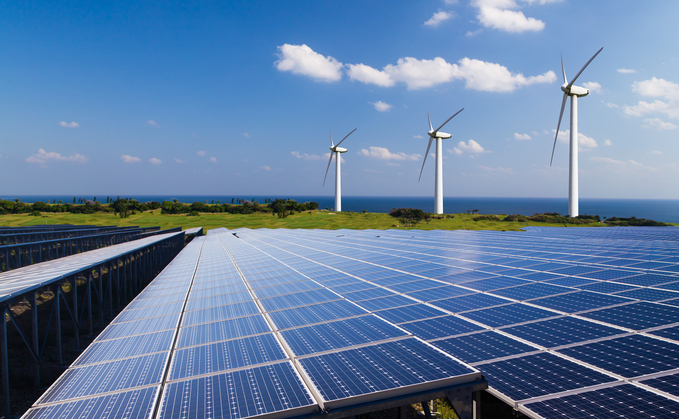
The government urgently needs to resolve the row over proposals for zonal pricing - Labour's clean power target and its promise of lower bills depends on it
I was speaking recently to someone who attended the Conservative Party conference and came away "really, really concerned" about the prospects for the UK's net zero transition over the next decade. At first glance, this is a highly counter-intuitive take. Voters have just handed a landslide victory to a Labour government with arguably the world's most ambitious clean energy programme and a clear mandate to mobilise billions of pounds of green investment. Meanwhile, the Conservatives have just endured their worst electoral performance in over a century and are more fiercely divided than ever on whether they should be emulating the climate hawks of the Lib Dems or the climate denialists of Reform. But look beneath the service and it is true there could be big trouble brewing for the UK's climate strategy.
Despite the best efforts of experts to rebut its flawed assessment of renewables' role in driving up UK energy costs and its heroically optimistic assumptions about the ability of nuclear power to provide the backbone of the UK's electricity system in a timely fashion, last month's Foundations essay on the root causes of Britain's flailing economic performance is now the prevailing view across the centre right. It may have amounted to an utterly damning critique of the last 14 years of Tory economic mismanagement, but it is now taken as gospel by many senior Conservatives.
As such, influential voices from the Tory leadership candidates on down are lining up to attack the 'hidden costs' of renewables and demanding the entire energy strategy they were pursuing when in office only four months ago is torn up. Nuclear boosterism provides a convenient cover for an approach that would result in a continued reliance on fossil gas and a drastic slowdown in the UK's net zero transition. Meanwhile, Ed Miliband's desire to actually deliver on climate targets the Conservative government signed up to is subject to increasingly visceral and often unpleasantly personal criticism. The previous government's genuine and admirable success in driving down emissions and catalysing clean energy investment is being disowned. The role of fossil gas in driving up energy costs is ignored and the dominance of renewables in a growing number of energy systems worldwide is dismissed as irrelevant.
But the problem for Labour and those businesses committed to accelerating the clean energy transition is that like all the best myths, some of the critiques of the UK's decarbonisation plans now being peddled by climate sceptics and right-wing commentators contain a grain or two of truth. For example, it is the case the UK has some of the highest industrial and domestic energy costs in the world. This is primarily the result of the economy's reliance on fossil gas and a function of an electricity market design that gives that gas an outsized role in setting wholesale power prices. But there is still a big challenge looming as increasing levels of variable renewable generation are integrated on to the grid. Some estimates reckon constraint payments to renewables operators to make them stop exporting power during periods of peak generation could reach £4bn by 2030. Meanwhile, Labour has maintained a studied silence on how it actually intends to tackle these constraint payments and stop volatile gas prices dominating the wholesale power market.
Ultimately, the success of Labour's hugely ambitious energy strategy will be determined by two metrics: can it deliver clean power by 2030; and, even more importantly for its electoral prospects, can it deliver on its promise that this clean power will be cheaper than fossil gas and energy bills will come down?
This should be possible, given renewables are the cheapest form of new power generation and new flexible grid technologies mean associated system costs can be minimised. But there is a growing sense across the industry that these promised savings will be very difficult, if not impossible, to realise under the current market arrangements. The fear is that even as renewables generation increases and the cost of gas imports fall, gas power plants will still set wholesale power prices, while at the same time constraint payments will only increase.
It is possible to envisage a nightmare scenario for the net zero transition where energy costs remain stubbornly high throughout the rest of the decade and renewables get the blame. This is clearly what some Tory strategists are already banking on happening. If their concerns are borne out the resulting political backlash could derail the entire net zero project, just as it should be preparing to accelerate into the 2030s.
The good news is this challenge should be surmountable. As a recent analysis from Nesta highlighted, the UK is very unusual in allowing gas to play such a dominant role in setting power prices. Other market regimes are available, and plenty of countries use them to good effect. It should be possible to pass through more of the cost savings unlocked by a clean and flexible renewables-dominated power system to households and businesses.
😭but why are UK electricity prices so high😭 pic.twitter.com/VDDZ7iUl3j
— Simon Evans (@DrSimEvans) October 1, 2024
The challenge is selecting the right package of market reforms and then developing a plan to transition away from the current system with minimal disruption. Which is why the somewhat arcane-seeming row yesterday over the government's Review of Electricity Market Arrangements (REMA) and the specific proposal to switch to a system of zonal or locational pricing where power prices vary across the country based on levels of supply and demand in each region is so important.
The group of 11 leading trade bodies that wrote to the government calling for it to rule out a switch to zonal pricing is adamant that the proposed reforms are simply too radical. They fear they will create uncertainty for clean energy developers, drive up the cost of capital, and fail to deliver promised energy bill savings in many parts of the country.
These concerns are not entirely unreasonable. It is important to note these trade bodies represent many - although crucially not all - clean energy developers and industrial energy users across the UK. It is true that what would amount to the biggest shake up of the energy market in decades would create uncertainty that could easily impact the cost of capital. When the government is in a race to deliver a massive increase in clean power capacity by 2030 such big reforms feel risky.
There are also concerns the benefits promised by a system of zonal pricing will take a long time to materialise and could even prove illusory. One of the main rationales for having lower power prices in Scotland and north east England where there is currently surplus supplies of clean power is that it should attract factories and data centres, which can then ensure that power does not go to waste. But moving the UK's industrial base is easier said than done and would be shaped by other factors, such as the strength of the skills base and existing sunk costs, besides the cost of energy. Similarly, the idea higher power prices in London and the south east would incentivise more development of renewables generation on the outskirts of London only works if you assume Labour's planning reforms are even bolder than advertised.
Importantly, the trade bodies argue it is possible to tackle the challenge of rising system costs and constraint payments through "evolution, not revolution". The letter insists that "reforms to transmission network charges and system balancing alongside strategic buildout of energy networks" should help curb energy costs and maximise the use of renewables capacity. If the UK can quickly build energy storage systems and pylons linking its renewables generating hot spots with its main population hubs then excessive constraint payments could prove short-lived. At the same time, the steady increase in renewables capacity should start to chip away at the influence of fossil gas in setting power prices, eventually resulting in the promised downward pressure on bills.
It is an optimistic scenario, but there is an increasingly compelling counter-argument. Yes, a switch to zonal pricing would be risky, but so too is a package of modest changes to the status quo that many experts fear will do little to curb wholesale power prices that remain amongst the highest in Europe. Some of the UK's most respected energy experts and the country's largest energy company in the form of Octopus Energy are adamant an 'evolution' of the current market arrangements will not decouple wholesale power prices from gas and will not tackle rising constraint payments in the medium term, if at all. They maintain a more radical approach is needed, and that is what zonal pricing offers.
In a debate that is becoming increasingly ill-tempered, some advocates of zonal pricing are accusing incumbent 'corporatist' energy companies of lobbying to protect a status quo where they benefit from higher prices and avoid the hassle of developing more flexible and dynamic operating models - and all at consumers' expense. They are also unconvinced the calls for an 'evolutionary approach' of 'incremental reform' amounts to a credible and coherent strategy for curbing constraint payments and systems costs. The fear is that incumbents are trying to lock in an approach that protects their profits in the short term, but fuels a backlash against any and all forms of policy support for renewables, which would then be unleashed just in time for the next election.
Supporters of zonal pricing also argue that far from pushing up energy costs, it would unlock significant savings for everyone. The potential is there for several regions across the north of the UK to suddenly have access to some of the cheapest power prices in Europe. The boost to industry, as well as the wider electrification of the economy through electric vehicles and heat pumps would be enormous. The claim is that even the losers in what would inevitably characterised as a 'postcode lottery' would not see higher energy bills compared to what they are facing now and would then enjoy cost reductions in the future as new transmission lines are built and more localised renewables projects start to come online.
Supporters of zonal pricing also insist disruption for developers and investors could be minimised through a combination of clear grandfathering rules for the current regime and the clarity provided by the government reaching what is a long-awaited decision. Once the rules of the game are confirmed, everyone should be able to crack on with realising the opportunities the reforms offer. This, they argue, is the experience of the many other markets that have successfully deployed a zonal pricing approach, driving innovation and lower costs in the process.
The choice facing the government is as tricky as it is high stakes. Both sides of the debate are arguing their preferred reforms offer the best route to lower energy costs and a faster build out of clean power capacity. And yet, they can't both be right. The government needs to weigh up the real and complex pros and cons and reach a decision - and it needs to do so soon.
Because while there is much uncertainty here, two things are clear.
The first is that the status quo is not a low risk option. The UK's high energy costs may be a function of a reliance on gas and a market design that the Conservatives have to take their share of the blame for, but they are already being weaponised and used to attack Labour's entire net zero strategy. The new government needs to find a way to drastically reduce the influence of gas prices over wholesale power prices and tackle rising constraint payments. If it can do so, it could solve a lot of the difficulties faced by its clean power mission - as well as a fair few of its wider political woes - in one swoop, delivering lower bills in the process. If it fails to do so the political pressure on the new government to tack away from its pro-renewables approach threatens to become one of the defining themes of the Parliament. It is worth noting it has taken the Prime Minister just three months to reshuffle his core team to make it more explicitly politically focused. Some insiders fear this could be bad news for the vision of a long-term, mission-driven, net zero-focused government.
The second is that the clock is ticking. Labour is already more than five per cent of the way through the Parliament and it is fair say that a Number 10 operation that is already staging its first 'relaunch' has not made the most impressive of starts. Whatever path Ministers opt for, a decision on the REMA package is needed sooner rather than later if investors and developers are to be provided with the clarity they need to start building the infrastructure at the heart of the clean power by 2030 mission. It is hard to see how Labour delivers clean power and lower bills within five years without urgent market reform and a clear and credible plan for minimising systems costs. The UK's net zero transition is not in trouble, but you can see how it could very quickly find itself under siege if the government fumbles this crucial decision.
A version of this article first appeared as part of BusinessGreen's Overnight Briefing email, which is available to all BusinessGreen Intelligence members.








